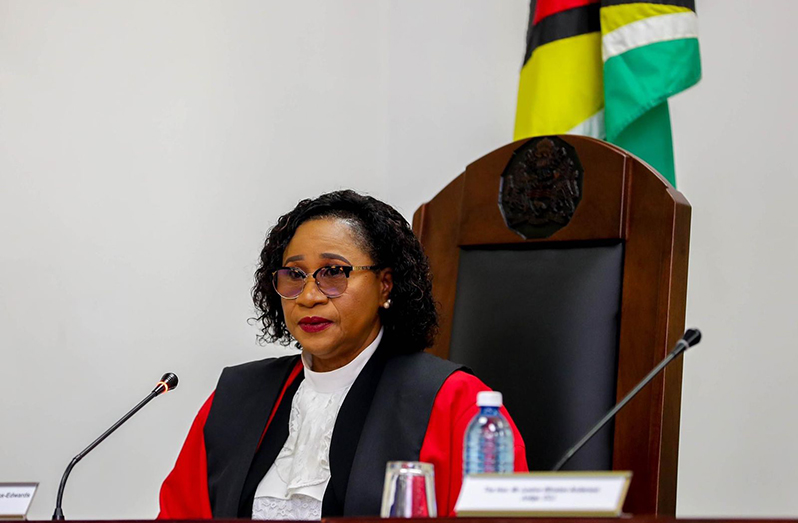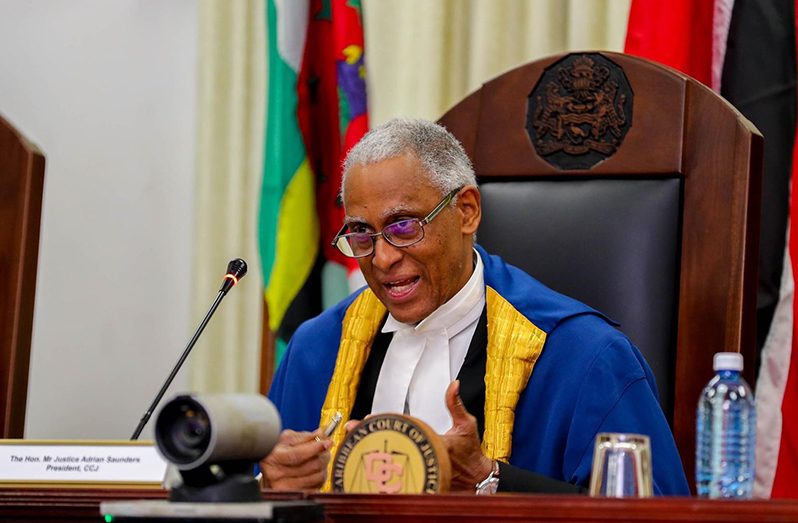– to engage with judiciary, bar, and civil society in Guyana
By Clestine Juan
PRESIDENT of the Caribbean Court of Justice (CCJ), Justice Adrian Saunders has said that the apex court serves as a catalyst for regional integration, promoting peace, justice, economic advancement, stability, and security.
He made these remarks on Tuesday during the opening ceremony of the CCJ’s second itinerant hearing in Guyana, held at the Arthur Chung Conference Centre (ACCC).
Over the course of the next two days, the CCJ would preside over five cases, with two originating from Guyana itself.
Since its establishment in 2005, Justice Saunders said the CCJ serves as the highest appellate court for member states of the Caribbean Community (CARICOM) that have acceded to the court’s appellate jurisdiction.
It acts as a replacement for the Judicial Committee of the Privy Council, ensuring that final appellate jurisdiction resides within the Caribbean region itself.

“The CCJ stands as both a product and a beacon of regional integration. The court is one of the vital means through which the aspirations of the people of the Caribbean community for peace, justice, economic advancements, stability [and] security, can be realised,” the CCJ president said.
President Saunders, however, stressed that a regional apex court cannot function as effectively if it is perceived as a remote, brooding infallible omnipresence since judges must avail themselves of occasions to interface directly with key stakeholders.
“Throughout the region, people from all walks of life need to have the opportunity to see, in flesh and blood, those who pass ultimate judgment on them,” Justice Saunders said as he expressed the court’s commitment to fulfilling the people’s desires for a stronger Caribbean community.
He explained that the CCJ’s mandate extends beyond resolving legal disputes. The court aims to initiate various projects aimed at enhancing access to justice and promoting awareness of the judicial process. These endeavours seek to strengthen the fabric of the region and empower its citizens by providing a fair and transparent legal framework.
The CCJ will “squeeze in” a number of activities to increase public awareness about the role of the court, and its methods, and also about the place of the court in the operations of the CARICOM Single Market and Economy (CSME).

In particular, Justice Saunders added that the CCJ will embark on an extended programme that will include activities to advance an ongoing project that has been developed with the Caribbean Forum of African, Caribbean, and Pacific States (CARIFORUM), under the 11th European Development Fund (EDF).
“This project aims to, specifically in Guyana, sensitise the judiciary, the bar, and other stakeholders about the CSME and the role of the court and national courts and tribunals within that CSME regime,” he said.
At the level of the judiciary and the bar, Saunders said that the CCJ will facilitate sessions to address the referral process under Article 214 of the revised Treaty of Chaguaramas.
“We will also engage with civil society and the public, including a session with students from the University of Guyana. Over the next week, we have scheduled a compact and robust schedule, and we look forward to the mutual exchanges and learnings that will no doubt ensue from all of these interactions, as we discuss matters concerning the administration of justice and how we can serve the people of Guyana and the community with excellence,” he said.
Meanwhile, Chancellor of the Judiciary (ag), Justice Yonette Cummings-Edwards, said that the CCJ presided over 111 matters for Guyana alone and has carved out a Caribbean jurisprudence that is “second to none.”
“This court is known to be revolutionary, forward-thinking, and even groundbreaking in some of its decisions that it has given over the years… Their honours have had their dockets dominated with a number of subject areas including criminal law, land law, constitutional law, and a number of election cases from Guyana… It is evident that Guyana has contributed significantly to the development of the Caribbean Court of Justice and its jurisprudence,” the Chancellor said.

Meanwhile, Chief Justice (ag) Roxane George hailed the CCJ for embracing the diversity of the Caribbean region while also emphasising the necessity for inclusion and harmonisation as it leads the judication in ensuring that the rule of law is upheld both in its original and appellate judications.
The Chief Justice stressed that the CCJ is also a champion of judicial and legal education through its arm, the CCJ Academy for Law and its support for the Caribbean Association of Judicial Officers.
“The CCJ sets a very high standard, leading us in the advancement of court technology and inspiring us, as it has done, to achieve excellence in court and judicial administration. And in doing so, this enduring regional institution- which has celebrated its 18th anniversary this year- educates, guides and enjoins us to ensure that in upholding the rule of law we engender public trust and confidence in our justice system,” the Chief Justice said.



.jpg)











